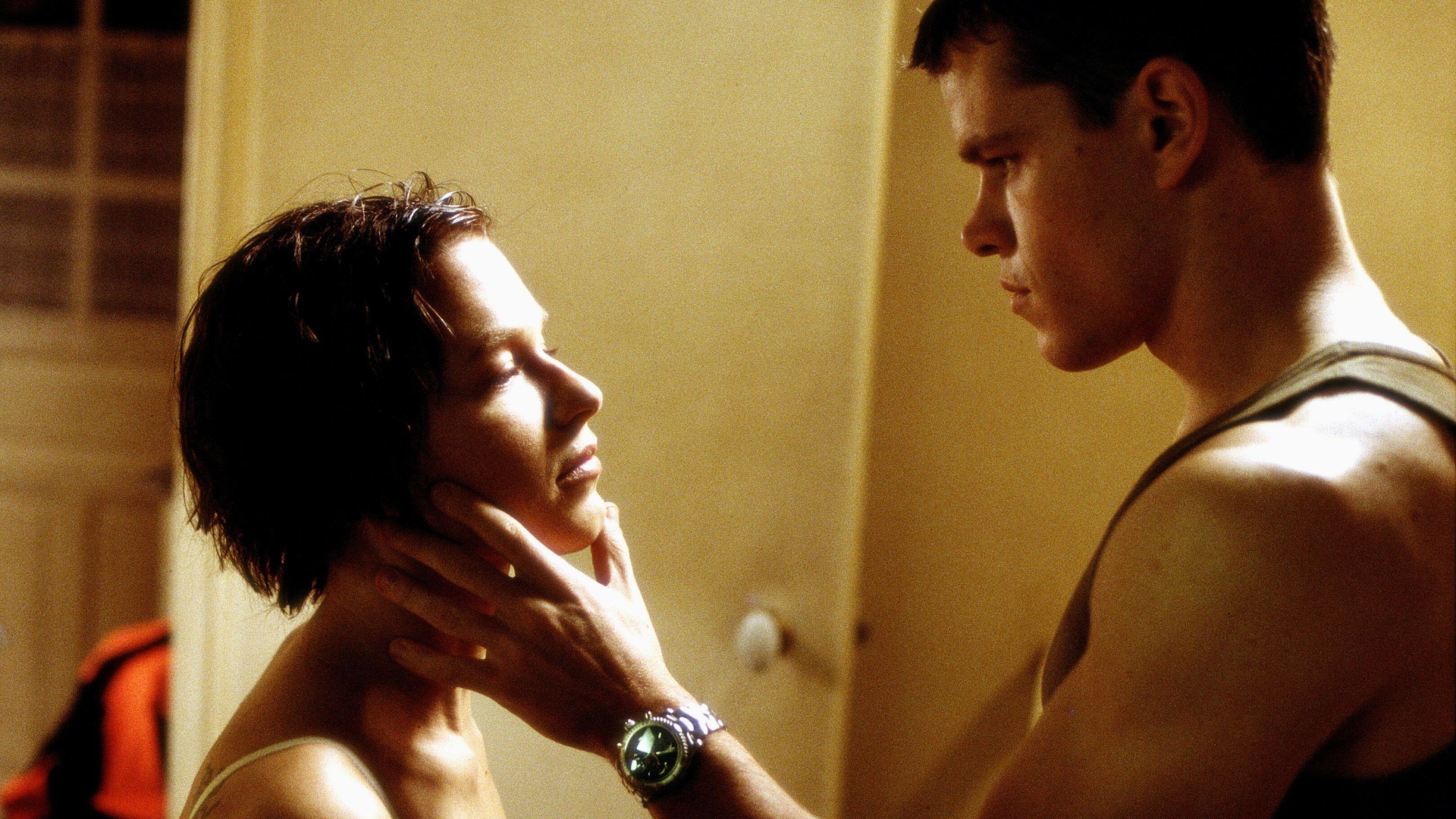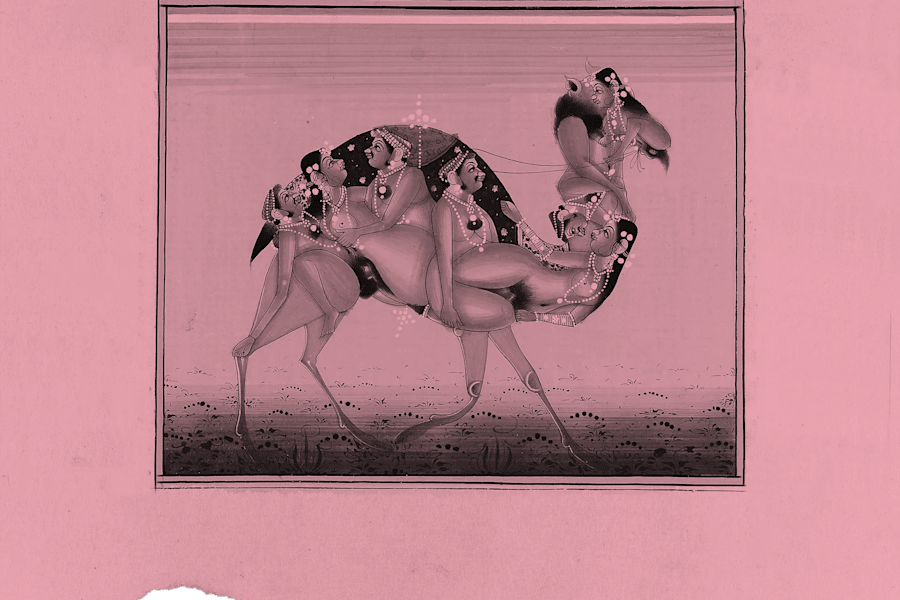On romantic amnesia and Jason Bourne

FAMKE POTENTE, MATT DAMON, THE BOURNE IDENTITY, 2002. Maximum Film / Alamy Stock Photo
Spy movies are low-key romance movies.
I’d like to say that when trying to connect with a new romantic interest—to explain “what I’m all about”—my film of choice is Francis Ford Coppola’s 1974 masterpiece The Conversation. It came out the year I was born; surely that implies something vaguely, astrologically poetic. I’d like to say I empathize with the film’s protagonist, surveillance expert Harry Caul, who soothes his unmet need for romantic love by paying tender attention to surreptitiously planted listening devices. I’d like to say that I’d show a prospective partner Michael Haneke’s 2001 psychosexual gem The Piano Teacher, starring Isabel Huppert. The film is achingly perverse, and has subtitles, which would demonstrate my willingness to engage with “difficult” art. I’d look both intellectual and horny, which isn’t inaccurate. I’d like to say a lot of things, but the truth is that if I needed to explain myself to a woman I liked by suggesting we watch a movie together, that movie would unfortunately be the 2002, uber-bro blockbuster The Bourne Identity.
The Bourne Identity opens with Matt Damon—playing the amnesiac titular character who doesn’t know he’s Jason Bourne, if that’s even his name (it isn’t)—having just been rescued by benevolent Italian fishermen who spotted him floating, unconscious, in the open sea.
Safely aboard a fishing boat, Damon is gently returned to the world of the living. Whatever happened to him, he’s remained stunningly muscular. This is where I become delusional. When I see Matt Damon, stripped of his soaking wet, seemingly expensive sweater, I see myself, my own body; ripped, strong, glistening, and lean. The whole point of movies, I might tell the woman I’m watching the film with months later once we’re living together, is to get lost in fantasy. She’d say something like, “Oh Brad, you’re so cute. It’s so funny you thought you looked like him.”
By means of various spy movie tropes, Damon’s character makes his way to a bank in Zurich, where he finds evidence of his life in a safety deposit box. One piece of evidence is a passport bearing the name Jason Bourne. As the now christened Bourne exits the bank, an employee makes a call to some shadowy figure at the CIA, and the trajectory of the film is established: Bourne, unsure of who he is and what he’s done, is relentlessly pursued by people who know both of those things, and want him dead.
When it comes to being single and back on the scene, I relate to the amnesia suffered by Bourne. I’m focused on the new woman—the woman I want to watch The Conversation with—and can’t remember a single detail about my ex. Some people say that breakups are hard, that their days and nights are spent thinking about the person they’ve recently disentangled themselves from. Not me. The end of a relationship always signifies the onset of liberation. Unlike Bourne, I don’t feel anxious and paranoid embarking on a new chapter in my life, I feel unencumbered, weightless, and hopeful. It’s been my experience that when engaged in a new romantic affair, any mention of a past partner can snuff the flame of desire. Luckily for me, like Bourne, I am always on day one of my own life, and don’t need to pretend, for the sake of the person I’m interested in, that I’ve never been in love before.
Jason Bourne is a highly trained assassin, sent on the most covert of missions by men in cheap suits who control the fate of the world. He isn’t aware of that yet, fleeing unknown enemies in the snowy streets of Zurich while armed with everything one might need to restart their life: multiple passports, stacks of cash, and, of course, a handgun. Eventually Bourne overhears Marie Kreutz, played by Franka Potente, arguing with her landlord about money. An ability to understand and speak almost any language is one of his mysterious skills. He doesn’t know who he can trust, and she doesn’t know if she can trust him. Bourne offers Kreutz $20,000 if she’ll drive him to Paris, and soon they’re on a road trip fraught with potential, both romantic and murderous.
There’s something about amnesia that makes me feel romantic. And a life-or-death decision made by two strangers in the midst of a crisis is fuel for a great “how we met” story at a dinner party. In The Bourne Identity, Kreutz desperately needs an influx of money, and Bourne desperately needs help escaping his pursuers. Two people, each at a crossroads, are capable of forging a new path together. This is the romantic ideal, and the secret hope of anyone finding themselves falling in love; a new life, once unimaginable, becomes possible through the introduction of a new partner.
There are different ways to look at the narrative that unfolds between the deeply damaged, amnesiac professional murderer, and his people-pleasing, car-owning paramour. Bourne injects himself into Kreutz’s life with the potency of a hyper-mutating virus, and as a result her life becomes increasingly unstable and dangerous. This, within a film that’s arguably quite fantastical, is a brutally realistic trope. A woman is introduced to a man who seems thrilling, who offers things typically unoffered, and she becomes, quite literally, his driver. Her life falls apart in service of her partner. Should someone read the film this way I wouldn’t say they were wrong.
But, as I would tell the new woman, because films are fantasies, and because I have the choice to interpret what I watch however I like, I consciously take a different approach.
As expected, Bourne and Kreutz fall in love while eluding his (and, as a result of her accomplice status, her) pursuers in her red Mini Cooper. His burden becomes her burden, as is true in any relationship: if it’s not deep cover sleeper agents activated to become hitmen by a text on their burner phone, then it’s debt, or illness, or a bad relationship with your mom or dad. What’s mine is yours, and true love is the experience of taking on as your own what beleaguers your partner. Bourne slowly discovers who he is—or rather, who he was—and attempts to right the wrongs of his past. He can’t bear what he’s done, but Kreutz never judges him. Here’s another romantic ideal; a partner you can confess your past sins to without losing their affection. (Admittedly, it’s The Bourne Identity, not The Kreutz Identity. Marie’s rather flat story exists only to further develop Jason’s.)
When I meet someone I like, I want to show them everything I care about, and I want to learn what those things are for them. I want to change their life, and I want them to change mine. Two people who aren’t loved but want to be, have love to give but no one to give it to, are also in a life-or-death situation. As corny as it sounds, love is all that matters. Without it, you risk walking through this life like a ghost, unaware of who you are because there’s no one to tell you. A new relationship is a blank slate, a chance to start over as if one had amnesia. Whatever you did wrong last time, you know not to do again. Whatever you were missing with your last partner, you can now seek out. I like The Bourne Identity because it's a story about romantic renewal disguised as a spy thriller. The only thing I like more than films about espionage are films about the experience of falling in love.
So if I were attracted to someone new, and wanted them to “know all about me,” I’d show them The Bourne Identity. But that won’t happen to me again, because when I met my wife ten years ago this week, she showed me The Piano Teacher, and I showed her The Conversation.


